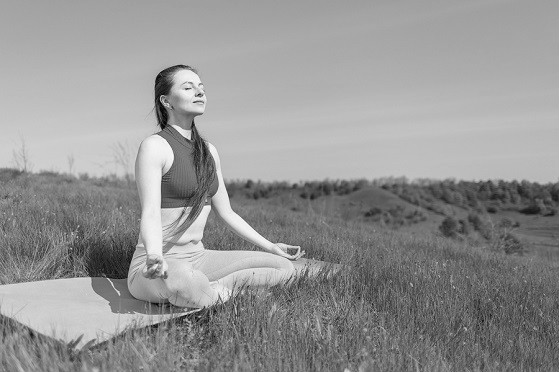Muktasana: The Pose of Liberation.

{source}
Flexibility. Strength. Mindfulness. Peace. Health. Yogis practice for a variety of reasons.
You’ve probably noticed how a good Yoga session can relieve your road rage or work stress and leave you feeling relaxed, happy and optimistic. For many, Yoga is more than a fitness regimen, it is a philosophy of life that extends beyond the studio. In fact, I’m convinced that Yoga can make you a morally better person.
To explore this claim, let’s start at the bottom, with the people society has marked as mistaken, bad, or even evil. In a perfect world, prisons would act as reformatories to rehabilitate these so-called bad people and produce model citizens upon their release.
And yes, I realize that not all prisoners are bad. Some make errors in judgment, some choose illegal activities as the most expedient means to help their families, and there are many crimes that probably shouldn’t even be illegal. But if we want to choose a segment of the population in which immorality is more common than in others, a prison is a good place to start.
In the United States, 40% of incarcerated adults return to prison within three years of their release.[i] In other words, nearly half of all prisoners experience no change in behavior as a result of their incarceration. Instead, inmates face constant struggles with captivity, solitude, isolation from family and friends, drug addiction, overcrowding and violence, and often emerge from prison no less likely to commit further crimes.
In recent years, prisons across the world have turned to Yoga as a low-cost, low-risk initiative to break the cycle of incarceration. The Swedish national prison service employs a Yoga coordinator, who trains prison guards as Yoga teachers.
In the United States, more than 20 prisons offer Yoga practices through the Prison Yoga Project, which provides teacher training and has sent more than 7,000 manuals to inmates so they can practice Yoga on their own. A similar program in the United Kingdom called the Prison Phoenix Trust organizes Yoga classes and sends Yoga and meditation CDs to inmates in about 80 prisons.[ii],[iii]
It should come as no surprise that practicing Yoga does induce positive behavior changes in prisoners. Inmates who practice Yoga show improvement in positive mood and decreases in stress, impulsivity, anxiety and depression.[iv]
The Richmond (Virginia) City Jail reduced recidivism by 18% after incorporating Yoga into its mental health program.[v] And a 2008 study showed that just 8.5% of prisoners who attended four or more Yoga classes were re-incarcerated upon release, compared to 25.2% of those who attended between one and three classes.[vi]
Yoga works even in the darkest corners of incarceration. Nick Brewer was sentenced to six years in Villa Devoto Prison in Buenos Aires, Argentina for cocaine smuggling. In his words:
“… the worst place I had seen in my life. They don’t have cells, they have open wings, where you can have anything from 100 to 400 people per wing. There were no beds so you’d literally be like sardines sleeping on the floor.
Every week someone was killed, so you saw a lot of mindless violence, beyond what I’d ever, ever experienced in England — people with machetes, guns, lances. You’d literally see people being mutilated and cut to pieces and stabbed to pieces.”
Eventually, wardens transferred Brewer and his co-defendant to a shared cell, where he began to practice Yoga.
“If it wasn’t for prison, I wouldn’t have got involved in Yoga, I wouldn’t be the person that I am today. I would probably be dead,” says Brewer, who now runs his own Yoga studio in London. “At one point, I actually became grateful for being in prison because I could feel this massive evolution, this change that was happening within me through Yoga.
So I almost became like a grateful convict, happy to be where I was, paying the time for my crime and rehabilitating myself.”[vii]
At first blush, Yoga seems too simple to create these incredible moral transformations. A typical Yoga session consists of just the yogi and her mat. There is no overt psychological therapy, no explicit attempt at behavior modification beyond maintaining one’s breath and sinking deeper into a pose.
Yet I believe it is precisely the simplicity of physical movement that engenders these profound changes. We can become better humans by recognizing the aspects of our lives that we can control and doing our best to produce the best outcomes in these situations, and by realizing that we must move and act in order to create meaningful change in the world.
A yogi, alone with his body and his mat, controls the success or failure of each pose and each practice. He alone is responsible for knowing his body’s capabilities, forming intentions for his practice, and bringing those potentialities into being through active movement. These habits translate beyond a Yoga practice to influence positive mood and behavior.
“We realized we weren’t doing anything for the physical piece of treatment,” says Dr. Alonzo C. Pruitt of the Richmond Jail’s mental health program before Yoga. “That’s an important part of the recovery process.”[viii]
“What we’re trying to do with any program is get inmates to think about how responsible they are for the crime they’ve committed and the consequences,” adds Bill Sessa, spokesman for the California Department of Corrections and Rehabilitation.[ix]
Conveniently, a good Yoga practice emphasizes these exact two elements. And while this combination of directed physical activity and individual responsibility is probably not unique to Yoga, I believe they are the keys by which Yoga is capable of modifying behavior, even in the case of convicted criminals.
So the next time you practice Yoga, remember that you’re not just getting mentally and physically healthier, you’re training yourself to become a better person.
Sources
[i] Pilon, Mary. “A Series of Poses for Fitness, Inside and Out.” New York Times. 3. Jan. 2013. Online. 15 Feb. 2014.
[ii] Mansel, Tim. “How Yoga is helping prisoners stay calm.” BBC News. 25 Sep. 2013. Online. 16 Feb. 2014.
[iii] Pilon, 2013.
[iv] “Prisoners doing Yoga may see mood benefits, study finds.” BBC News. 11 Jul. 2013. Online. 16 Feb. 2014.
[v] Pilon, 2013.
[vi] Landau, Pashupati Steven and Gross, Jagat Bandhu John. “Low Reincarceration Rate Associated with Ananda Marga Yoga and Meditation.” International Journal of Yoga Therapy, No. 18, 2008. Online. 20 Feb. 2014.
[vii] Mansel, 2013.
[viii] Pilon, 2013.
[ix] Ibid.***
***
Greg Hickey is a former personal trainer and professional baseball player and coach, and current author, endurance athlete and forensic scientist. He is the author of Our Dried Voices and KineSophy: The Ethics of Human Movement. The latter title is available for free on his blog, where he bridges topics in health, society, ethics and movement philosophy.
***
{Join us on Facebook, Twitter, Instagram & Pinterest}


